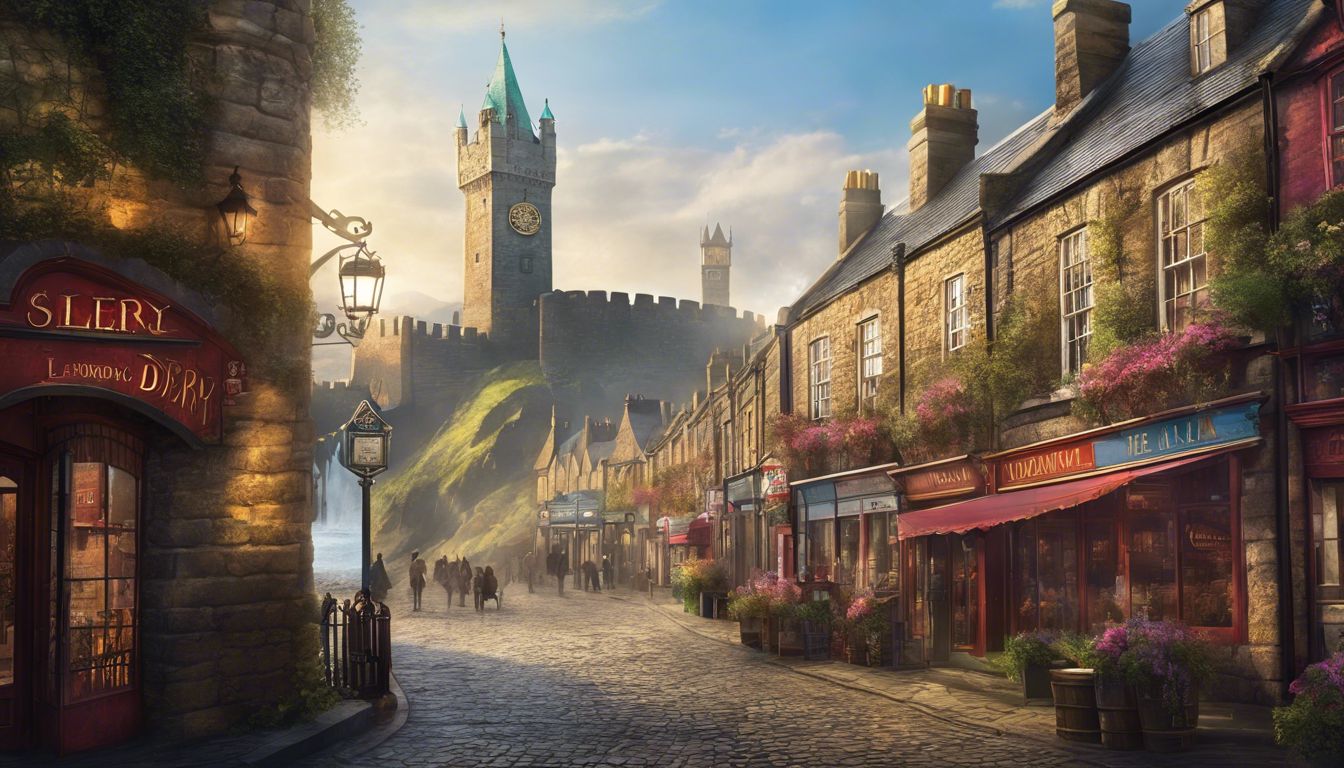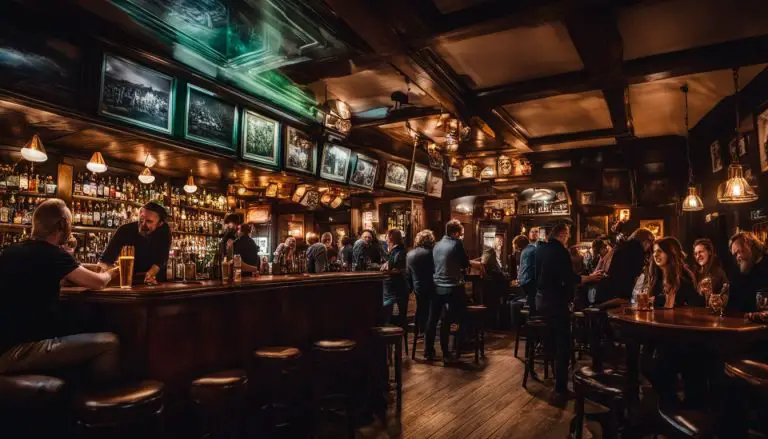Why is Derry Called Londonderry? Exploring the Name Dispute and History Behind the City’s Dual Identity
Have you ever wondered why some people call a city in Northern Ireland “Derry” and others call it “Londonderry”? The story behind the two names is filled with history. Back in 1613, Derry got its longer name when London guilds helped settle there.
They called it Londonderry to show British power. Today, Irish nationalists prefer “Derry” because it’s closer to the original Irish name “Doire.” On the other hand, unionists stick with “Londonderry.”.
This naming fight isn’t just about what sounds better. It’s really about the city’s past and who should get to decide its future. Some people think of renaming as a way that big powers used to control places like Derry long ago.
Still, even if officials say “Londonderry,” many local folks and groups keep calling it “Derry.”.
The walls around this medieval city have seen lots of fights over hundreds of years. These struggles are part of why the name issue keeps going on today. The clash shows how people feel different about Northern Ireland being part of the UK or joining up with Ireland.
Even though there’s this debate, Derry or Londonderry has much more than a tricky name. It’s known for its cool old walls and rich culture too! And guess what? This place’s story might teach us more about bigger problems elsewhere.
So let’s step inside this historic city’s walls and discover all about its two names!
Key Takeaways
- Derry got the name Londonderry when London guilds took over in 1613.
- Nationalists call it Derry, but unionists say Londonderry.
- The two names show a big clash over history and politics.
- “Legenderry” is used sometimes to avoid choosing sides.
- Derry/Londonderry’s story includes royal charters, plantations, and sieges.
The Name Dispute
The name dispute surrounding Derry/Londonderry originates from the historical usage and prefix of the city’s name. The debate over the official name has led to various avoidance strategies and incidents in response to the dispute.
Origins of the Name
Derry’s original name comes from the Irish word “Doire,” meaning oak grove. In 1613, a Royal Charter officially renamed it Londonderry. Wealthy London guilds had invested in the area and wanted their mark on the city.
They helped build its walls and funded other projects. Giving Derry a new name was part of this change.
This renaming also served to assert control over the land and people. It aimed to keep Irish residents, who were moved to less desirable areas, away from the city center. The addition of “London” showed power and ownership by these English financiers during a time of tension between England and Ireland.
Historical Usage
After being officially renamed Londonderry in 1613 by a Royal Charter, the usage of the name has been a subject of controversy and dispute. The dual identity of Derry/Londonderry is reflected in various contexts such as official council use, signage on roads and maps.
While the name “Londonderry” is primarily used by unionists and British loyalists, nationalists prefer to refer to the city simply as “Derry”. This historical usage reflects deep-seated cultural and political associations that have shaped this iconic city in Northern Ireland.
The ongoing naming dispute continues to be a contentious issue in the region, highlighting the complex and conflicting historical identities attached to Derry/Londonderry.
Avoidance Strategies
In response to the name dispute, various avoidance strategies have been employed:
- Business and Council Slogans: In public communications, neutral terms like “Legenderry” have been used as a compromise.
- Verbal Ambiguity: Some locals simply choose to avoid using the city’s name altogether in contentious conversations or use both names interchangeably.
- Emphasis on Neighborhoods: Residents often refer to specific areas within the city rather than using its overall name.
- Visual Representations: Art and media often depict the city’s landmarks without prominently displaying its name, allowing viewers to draw their own conclusions.
- Fostering Unity: Efforts are made by community leaders to emphasize shared values and heritage over divisive naming issues.
The London Connection
The London connection dates back to the early history of the city, with significant influence from plantation and 17th-century upheavals. This historical context sheds light on the dual identity of Derry/Londonderry today.
Early History
Derry/Londonderry, an iconic city in Northern Ireland, has a rich and complex early history marked by medieval origins and strategic significance. The settlement’s establishment dates back to the 6th century when St.
Colmcille founded a monastery here, contributing to the city’s cultural heritage that still resonates today. Later on, during the Plantation of Ulster in the 17th century, London guilds financed projects in the area and renamed the city Londonderry through a Royal Charter in 1613.
This move was not merely symbolic; it highlighted London’s significant influence in shaping the region while also reflecting political complexities.
Derry/Londonderry’s early history is deeply connected with its geographical location along River Foyle and its role as a fortress town. The construction of its famous walls began in 1613, fortifying it against potential invaders and securing its position as a vital military garrison for centuries to come.
Plantation
In 1609, the London guilds began a plantation in Ulster, including Derry. They brought in English and Scottish settlers to colonize the area and establish control over the region. This colonization effort aimed to secure land that was dominant with Irish inhabitants by relocating them to less desirable territories.
The plantation resulted in demographic changes and cultural tensions that have had lasting effects on the city’s identity and history.
The London guilds sought to consolidate their influence by renaming the city Londonderry through a Royal Charter in 1613, further cementing their authority over the region. This historical context plays a crucial role in understanding the modern-day naming dispute between Irish nationalists and unionists concerning the dual identity of Derry/Londonderry.
17th-Century Upheavals
The 17th-century saw significant unrest and conflict in Derry. Plantation, led by wealthy London guilds, caused upheaval as the Irish were displaced from their lands. The name change to Londonderry was part of this period’s impact on the city, with tensions between different cultural and political groups intensifying.
Amidst the Plantation scheme, notable upheavals occurred, including the Siege of Derry in 1689 during the Williamite War. These conflicts further entrenched divisions and contributed to making Derry/Londonderry a symbol of historical and political complexities that persist today.
The Debate on Renaming the City
The debate on renaming the city revolves around the local government and official names, incidents, and responses to the dispute. Read more about the history behind Derry/Londonderry’s dual identity and the ongoing naming controversy.
Local Government and Official Names
Derry or Londonderry’s official name is a contentious issue. The City of Derry and Strabane District Council prefers using “Derry,” reflecting the nationalist sentiment, while the British government and unionists use “Londonderry.” Despite efforts for reconciliation, road signs reflect this division with some showing only “Londonderry” and others adding “London-” as graffiti-resistant stickers.
This reflects an ongoing battle over identity.
The debate on naming continues to evoke strong emotions among locals, bearing historical implications that go beyond mere labels. Multiple layers of political undertones make it challenging to reach a consensus regarding the city’s official title.
Incidents and Response to Dispute
Following the local government and official names, incidents related to the name dispute have sparked various responses:
- The 1969 riot, also known as the Battle of the Bogside, was a significant incident that propelled the name controversy into national and international attention.
- Subsequently, the local government’s decision to use both Derry and Londonderry on civic documents aimed to ease tensions and promote inclusivity.
- In 2010, a proposal to officially rename the city “Derry” failed, emphasizing the ongoing divisions and complexities surrounding the issue.
- Efforts by organizations and individuals advocating for either name reflect the deep – rooted cultural significance associated with each identity.
- The response involves ongoing public debates, demonstrations, and political negotiations at local council level engaging with nationalists and unionists in finding a resolution.
The Dual Identity of Derry/Londonderry
The governance and coat of arms, geography and climate, as well as the economy and cultural significance all contribute to the unique dual identity of Derry/Londonderry. Read more about this fascinating city’s complex identity and history!
Governance and Coat of Arms
The city of Derry/Londonderry is governed by the Derry City and Strabane District Council, representing both unionist and nationalist communities. It has a unique coat of arms featuring symbols such as a skeleton, a ship, and red hand from the O’Neill family crest.
The coat of arms embodies historical references and reflects the complex identity of the city.
Londonderry holds significance in Northern Ireland’s governance, showcasing its rich history with a distinctive coat of arms that captures its past. The council’s administration serves both nationalist and unionist populations while symbolizing the region’s intricate cultural heritage through its emblematic representation.
Geography and Climate
Derry/Londonderry is nestled in the northwest of Northern Ireland, with the scenic River Foyle flowing through its heart. The city’s geography is characterized by gentle hills and fertile plains, surrounded by lush countryside and coastal landscapes.
Its climate is mild and temperate, influenced by its proximity to the Atlantic Ocean and Gulf Stream. Summers are generally warm, while winters are relatively mild compared to other parts of the UK.
The surrounding landscape features striking natural beauty, from the rugged cliffs along the coast to expansive green fields further inland. Derry/Londonderry experiences a moderate amount of rainfall throughout the year, contributing to its verdant surroundings.
Economy and Cultural Significance
The city of Derry/Londonderry has a diverse and resilient economy, contributing significantly to the region’s prosperity. Its key sectors include manufacturing, healthcare, education, and technology.
The city is home to several multinational companies, fostering employment opportunities and economic growth. Furthermore, Derry/Londonderry thrives as a cultural hub with its vibrant arts scene and historical landmarks attracting tourists from around the world.
The city’s cultural significance is evident in its indigenous music festivals and rich literary heritage that continue to shape its identity.
Derry/Londonderry holds an esteemed place within Irish culture due to its long-standing history and ardent community spirit. The city continues to preserve ancient traditions through various events celebrating folklore, dance, language, and cuisine.
As a testament to this rich heritage, Derry/Londonderry was awarded the UK City of Culture in 2013 – recognizing its profound influence on literature, artistry, and creativity within Ireland.
Conclusion
In conclusion, the naming dispute of Derry/Londonderry reflects deep historical and political complexities. The city’s dual identity is rooted in its conflicting associations. This issue continues to be a contentious one with cultural and national significance.
The region’s rich history adds depth to the debate. Its name holds a strong historical and political significance for both Irish nationalists and unionists.
FAQs
1. Why do some people call the city Derry and others Londonderry?
The name difference comes from history and politics. “Derry” is the original name, but “Londonderry” was added when London companies got involved with the city’s trade. Today, nationalism and politics keep the dual identity alive.
2. When should I use Londonderry instead of Derry?
Use “Londonderry” to follow official use or legal naming rules, especially in formal situations or documents. Some people might also prefer it for cultural or historical reasons.
3. Is there a county with this name too?
Yes, there is a County Londonderry that surrounds the City of Derry/Londonderry.
4. Does this name dispute affect everyday life in the city?
Yes, it can affect daily life as some groups identify more with one name than the other due to political beliefs tied to events like partition and national identity.







